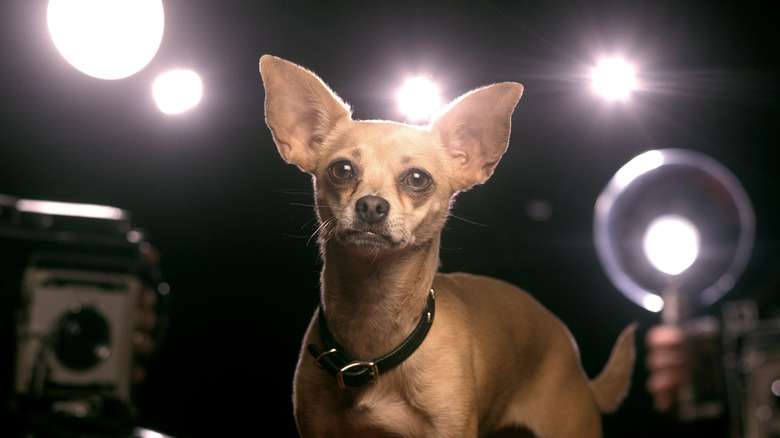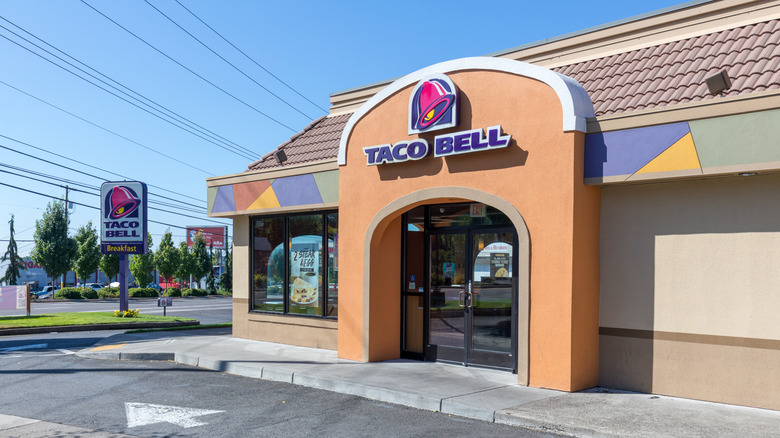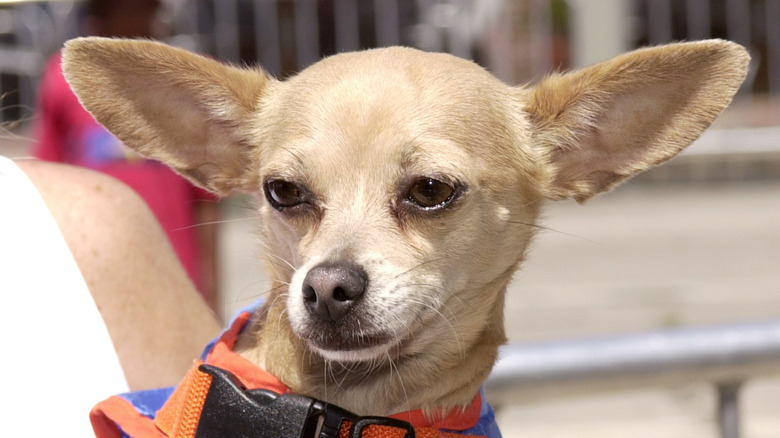Why The Taco Bell Chihuahua Ads Got The Company Into Hot Water
Taco Bell has a habit of revisiting the past in an effort to spark nostalgia, like it did with the limited-time Decades Menu that brought back fans' old favorite foods. What the chain doesn't want to revisit, though, is its 1990s ad campaign that featured Gidget the chihuahua and the voice actor Carlos Alazraqui. Together, these two planted the phrase "Yo quiero Taco Bell" in the minds of millennials for eternity. However, it turns out that the story behind Taco Bell's infamous ad campaign doesn't exactly match the chill vibes the fast food restaurant was trying to give off at the time.
At a 1996 New York trade show, Joseph Shields and Thomas Rinks were pitching their idea for a cartoon dog they called "Psycho Chihuahua." They were spotted by Taco Bell's licensing manager Ed Alfaro who then took the idea back to Taco Bell. After a few months of what seemed like the fast food company preparing to run with "Psycho Chihuahua," Taco Bell then shocked not only Shields and Rinks but also Alfaro by pulling out of the deal.
Not long after, Taco Bell partnered with a different ad agency, TBWA Chiat/Day, which presented an idea for an ad campaign starring a talking chihuahua. Despite Alfaro pointing out the similarities between this ad and the one pitched by Shields and Rinks, company executives including Peter Waller, the chain's president, and Chief Marketing Officer Vada Hill decided to roll with the new chihuahua idea. Unsurprisingly, Shields and Rinks filed a lawsuit against Taco Bell shortly after the first commercial aired in 1997.
Taco Bell was ordered to pay millions
While Gidget the chihuahua was busy gaining fame, behind the scenes, the lawsuit against Taco Bell was quickly becoming one of the most interesting food lawsuits of all time. In June 2003, Taco Bell was ordered by a federal jury to pay Thomas Rinks and Joseph Shields $30 million in damages. Shortly after, a judge added an additional $12 million of interest to the total.
The immense amount of money owed prompted Taco Bell to file a lawsuit against the ad agency TBWA Chiat/Day, claiming the company was liable for the damages as it had plagiarized "Psycho Chihuahua." TBWA was represented in the case by Doug Emhoff (who would later become the United States' first ever second gentleman). Emhoff claimed the ad agency was no more than a third party caught in the middle. In 2009, it was finally ruled that the ad agency was not liable for any of the damages regarding the '90s ad campaign and that Taco Bell was solely responsible for paying the amount owed to the creators of "Psycho Chihuahua."
Many thought the advert was racist
Aside from costing the chain millions of dollars, the Taco Bell chihuahua ad campaign also raised eyebrows. Many people thought the campaign was racist or, at the very least, insensitive and distasteful. It may have been possible for Taco Bell to save the campaign and keep the chihuahua if it had shifted gears early on, but the fast-food giant made matters worse with the release of a 1998 commercial that featured the dog in a beret — an unsubtle representation of revolutionary Che Guevara. The commercial sparked outrage, and a civil rights activist from Sacramento, Mario Obledo, told the LA Times, "To equate a dog with an entire ethnic population is outrageous, despicable, demeaning, and degrading."
It turns out, many consumers felt the same way. In 2000, Taco Bell sales in restaurants that had been open for at least one year fell by 6% in the second quarter. This decline was the largest the company had ever experienced and many people blamed the chain's chihuahua ad campaign. (This made Taco Bell's chihuahua ad campaign far more damaging than any other fast food marketing gaffe from around this time, including Burger King's 1980s advertising error.) As a result, Taco Bell switched advertising agencies, leaving TBWA Chiat/Day — and Gidget — behind.


